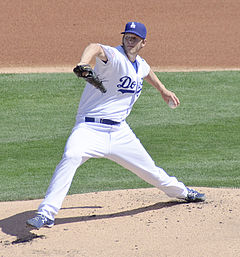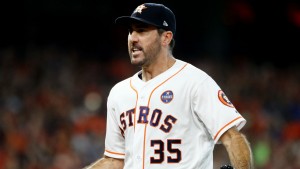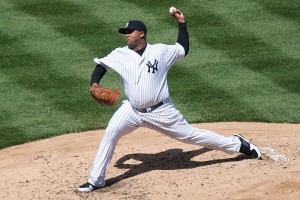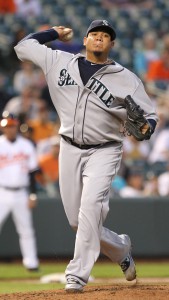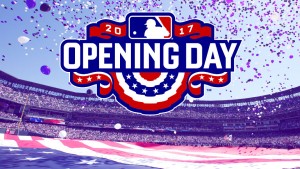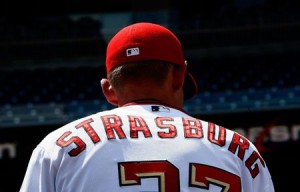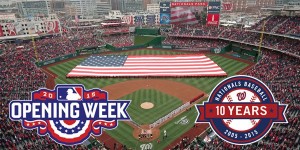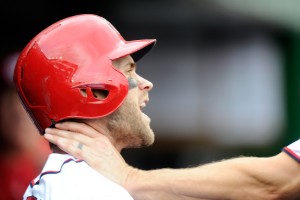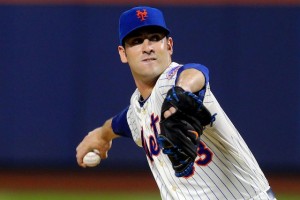
The best pitcher on the best rotation in the league. Photo: Brad Penner-USA TODAY Sports
I’m returning to a fun post that I did in 2013 and again in 2014 (but couldn’t find the time to do while switching jobs in 2015): Ranking the MLB rotations 1-30 ahead of the new season. I normally wait to do this post until all the significant starter free agents have signed; when Yovani Gallardo signed, he was the final QO-attached starter who might make a difference in a team’s ranking, so it was time to publish.
This is not a scientific analysis necessarily; i’m not looking at PECOTA or ZIPS to project war to do my rankings. Rather, this is an eye test of the guys projected to pitch 1-5 for each team in the coming season. So feel free to disagree. For what its worth, I am pretty confident in my top 10 and my bottom 5 rotations … but am not exactly going to argue vehemently that the rotation i’ve got ranked 22nd is appreciably better than the one I have ranked 24th.
At the bottom i’ve put links to other pundit’s rankings, which are similar but different.
As always, I show my work; here’s the rotation ranks worksheet that I use to track rotation players. As an added bonus to what is shown below, the worksheet color codes new acquisitions, puts in “depth” for each team and tracks who the team lost from last year. it also has a list of as-of-yet-unsigned hurlers, though none would move the needle if/when they sign for 2016.
I’ll put these into sections and put in comments as we go.
| Team |
Rank |
Projected 2016 Rotation 1-5 |
| New York Mets |
1 |
Matt Harvey, Jacob deGrom, Noah Syndergaard, Steven Matz, Bartolo Colon |
| St. Louis |
2 |
Adam Wainwright, Michael Wacha, Carlos Martinez, Jaime Garcia, Mike Leake |
| San Francisco |
3 |
Madison Bumgarner, Johnny Cueto, Jeff Samardzija, Matt Cain, Jake Peavy |
| Cleveland |
4 |
Corey Kluber, Carlos Carrasco, Danny Salazar, Trevor Bauer, Cody Anderson |
| Washington |
5 |
Max Scherzer, Stephen Strasburg, Joe Ross, Gio Gonzalez, Tanner Roark |
Discussion 1-5: My top 5 is pretty similar to other people’s top 5 rotations. I don’t think anyone would argue against the Mets being at #1; if Zack Wheeler comes back healthy he can replace either the ageless Colon or the oft-injured Matz and perhaps even improve what is clearly the class of the league. I have St. Louis #2 since everyone seems to forget just how good they were last year; yes they lose Lynn but they gain back Wainwright.
I could see why people could argue against having both San Francisco and Cleveland higher than Washington, and indeed over the course of the winter I had Washington above both. But I’m convinced that both of SF’s new acquisitions Cueto and Samardzija will completely thrive playing in the NL West, and you can do worse than Cain/Peavy as your 4/5. They have some depth in case those two veterans get hurt and I see SF as a sneaky NL West challenger in 2016.
Cleveland you say? Kluber is a former Cy Young winner who hasn’t forgotten how to pitch, Carrasco and Salazar are two of the best young arms in the league (I’m seeing Carrasco in particular going very high in fantasy ADP rankings for 2016), and their 4/5 are comparable to Washington’s back end. If you wanted to argue that man for man Washington was just ahead of Cleveland i wouldn’t disagree; i’ve been burned over-ranking DC’s rotation in the past so perhaps I was gun shy this time around.
| Team |
Rank |
Projected 2016 Rotation 1-5 |
| Chicago Cubs |
6 |
Jake Arrieta, Jon Lester, John Lackey, Jason Hammel, Kyle Hendricks |
| Arizona |
7 |
Zack Greinke, Shelby Miller, Patrick Corbin (TJ), Robbie Ray, Rubby De La Rosa |
| Los Angeles Dodgers |
8 |
Clayton Kershaw, Scott Kazmir, Alex Wood, Kenta Maeda, Mike Bolsinger |
| Seattle |
9 |
Felix Hernandez, Taijuan Walker, Hisashi Iwakuma, Nate Karns, Wade Miley |
| Chicago White Sox |
10 |
Chris Sale, Jose Quintana, Carlos Rodon, John Danks, Erik Johnson |
Discussion 6-10: So, is Washington > than the Cubs? I think so: I don’t view Lester as a real #2 any more, Lackey is approaching retirement and their 4/5 are basically 5th starters easily found on the waiver wire; i’d take the Nats’ 3-4-5 over the Cubs any day. Still, Arrieta‘s 2nd half was legendary and it is possible that Lackey puts up a 3-win season, so they’re still quite good. Both Arizona and the Dodgers are propped up by virtue of their Aces; the back side of both rotations looks downright scary. In fact, you can say the same for Seattle and the White Sox too; all four of these teams have league-wide top end Aces and then 5th starters who seem like they could be replaced by someone in AAA. That’s really the difference between these teams and the top 5 ranked teams; its the back of the rotations, not so much the front.
I could be slightly wrong about Seattle’s depth; if Iwakuma is really hurt and if Felix‘s decline phase has really started, then Seattle’s a notch down. If Rodon takes the step forward that he can, then the White Sox can really become a force of a rotation quickly.
| Team |
Rank |
Projected 2016 Rotation 1-5 |
| Pittsburgh |
11 |
Gerrit Cole, Francisco Liriano, Jeff Locke, Jon Niese, Ryan Vogelsong |
| Houston |
12 |
Dallas Keuchel, Collin McHugh, Lance McCullers, Mike Fiers, Scott Feldman |
| Boston |
13 |
David Price, Clay Buchholz, Rick Porcello, Eduardo Rodriguez, Roenis Elias |
| Tampa Bay |
14 |
Chris Archer, Jake Odorizzi, Erasmo Ramirez, Drew Smyly, Matt Moore |
| Detroit |
15 |
Justin Verlander, Jordan Zimmermann, Anibal Sanchez, Daniel Norris, Mike Pelfrey |
Discussion 11-15: So again looking at edge cases, I have the likes of Seattle and Chicago > Pittsburgh based on the strength (or lack there of) of the back-end of Pittsburgh’s rotation; Niese? Vogelsong?? Really? I just have a hard time believing that Pittsburgh is going to reach 90 wins with this 2016 rotation. Houston is one Cy Young winner and four guys who look like 4-A replacements. I like the Price signing … but Price is not exactly Kershaw-esque when it comes to putting up constant shut-down performances; Price gets just lit up some times. Last year he had outings where he gave up 10 hits/8 runs in 2+ innings and a 13-hit 6 1/3 outing. 75% QS rate, which sounds good but isn’t in the 82-85% range like Kershaw and Arrieta. My point is this: Price goes to the AL East, to pitching in a hitters park, and he can take some big numbers. The rest of Boston’s rotation is weak too; would you trust Buchholz at this point? Porcello is their #3 and he’d be in the Syracuse if he played for us.
In fact, Maybe I have Tampa and Detroit too low; Tampa in particular could be a monster if Moore comes back strong and Archer is as good as he could be. If Verlander can capture his 2nd half form … then Detroit could take a big step up too.
| Team |
Rank |
Projected 2016 Rotation 1-5 |
| Texas |
16 |
Yu Darvish (TJ), Cole Hamels, Derek Holland, Martin Perez, Nick Martinez |
| Miami |
17 |
Jose Fernandez, Wei-Yin Chen, Jared Cosart, Tom Koehler, Adam Conley |
| Kansas City |
18 |
Yordano Ventura, Edinson Volquez, Danny Duffy, Ian Kennedy, Chris Young, Kris Medlen |
| Los Angeles Angels |
19 |
Garrett Richards, Jered Weaver, Andrew Heaney, Matt Shoemaker, ? |
| New York Yankees |
20 |
Masahiro Tanaka, CC Sabathia, Michael Pineda, Nathan Eovaldi, Ivan Nova |
Discussion 16-20: Texas is an interesting one; Darvish won’t be ready for opening day, but if he comes back this ranking could rise. Likewise, I might have Miami too low considering that Fernandez is one of the top pitchers in the game; i just don’t trust the rest of their rotation, and the Chen signing made zero sense for a team that can’t seem to decide if they’re trying to win or not. The strength of Kansas City’s pitching staff isn’t their starters; its the bullpen (best in the league along with the Yankees), and the Kennedy signing seemed to make no sense. Thanks to two early ST injuries, I literally have no idea who the Angels 5th starter is going to be now … perhaps they should now be lower. Lastly you have the Yankees: every guy in their rotation seems like a huge question mark; Tanaka has a torn UCL, Sabathia is a shell of who he once was, Pineda had a shoulder injury that cost him all of 2012 and half of the next two seasons, Nova just came off of Tommy John surgery, and Eovaldi (himself on his 2nd elbow ligament) can’t find the plate. If these guys are ranked 20th … imagine what’s coming below.
| Team |
Rank |
Projected 2016 Rotation 1-5 |
| San Diego |
21 |
James Shields, Andrew Cashner, Tyson Ross, Robbie Erlin, Colin Rea |
| Toronto |
22 |
Marcus Stroman, Marco Estrada, R.A. Dickey, J.A. Happ, Drew Hutchison |
| Oakland |
23 |
Sonny Gray, Jesse Hahn, Chris Bassitt, Kendall Graveman, Rich Hill |
| Baltimore |
24 |
Ubaldo Jimenez, Chris Tillman, Yovani Gallardo, Miguel Gonzalez, Kevin Gausman |
| Atlanta |
25 |
Julio Teheran, Matt Wisler, Manny Banuelos, Bud Norris, Williams Perez |
Discussion 21-25: As with all the edge cases, perhaps you can squint at San Diego and say they could be ranked higher. Perhaps; but take any of those 5 guys at this point and put them in a hitter’s park and they’re not half as good. I like Stroman (former Nats draft pick!) but the rest of the Toronto rotation looks like guys who are just holding on. I’m not sure even Oakland’s management knows who some of their rotation candidates are.
I might be selling Baltimore a bit short; I’ve just never been convinced that Jimenez can repeat his earlier glory, and Baltimore’s notoriously awful coaching staff has seemingly ruined yet another young vibrant arm in Gausman. Atlanta’s rotation may not look that great right now, especially considering that they’re purposely tanking in 2016 … but they have a couple of sleeper potentials and their prospect depth (including two high end hurlers in Michael Foltynewicz and Aaron Blair) put them above the bottom 5.
| Team |
Rank |
Projected 2016 Rotation 1-5 |
| Philadelphia |
26 |
Aaron Nola, Jeremy Hellickson, Charlie Morton, Vincent Velasquez, Brett Oberholtzer |
| Cincinnati |
27 |
Anthony DeSclafani, Michael Lorenzen, Raisel Iglesias, Brandon Finnegan, John Lamb |
| Minnesota |
28 |
Phil Hughes, Ervin Santana, Ricky Nolasco, Kyle Gibson, Tommy Milone |
| Milwaukee |
29 |
Matt Garza, Wily Peralta, Jimmy Nelson, Taylor Jungmann, Zach Davies |
| Colorado |
30 |
Jorge De La Rosa, Chad Bettis, Jordan Lyles, Jon Grey, Tyler Chatwood |
Discussion 26-30: The bottom 5 rotations feature two teams clearly tanking (Philly and Cincy) who are throwing out mostly kids and 4-A one-year acquisitions. Its telling that these two rotations are better than the bottom 3 rotations, each of which belongs to a team that just seems to have no idea how to build a modern rotation. Minnesota has for years favored soft-tossers and not pursued high-end arms and now they have a relatively highly paid rotation of guys who, well, are not effective. Milwaukee is in the same boat, having shelled out money for Garza just to watch him implode.
Lastly we come to Colorado, who still is searching for a strategy upon which to build a rotation. The latest seems to be to pursue high velocity fastball guys who can just throw their ball through the light air and fool hitters. But they’re not there yet and their Ace for 2016 is a 35yr old with a career 4.55 ERA. Its not looking pretty in Colorado for 2016 and the fact that they havn’t sold off all their quality outfielders for parts speaks to the incompetence and indecision of their front office. You’re not going to win in 2016; you’re in a division with the Dodgers, Giants and Diamondbacks, all of which spent big (either last off-season or before) and are putting out quality lineups.
—-
Some other pundit’s rotation ranks for 2016 for comparison purposes.
http://espn.go.com/blog/buster-olney/insider/post?id=12054
http://www.sbnation.com/mlb/2016/1/12/10755692/baseball-rotation-rankings-mlb
All 30 MLB teams’ starting rotations, ranked
http://www.sportsonearth.com/article/164500586/top-10-pitching-staffs-major-league-baseball
